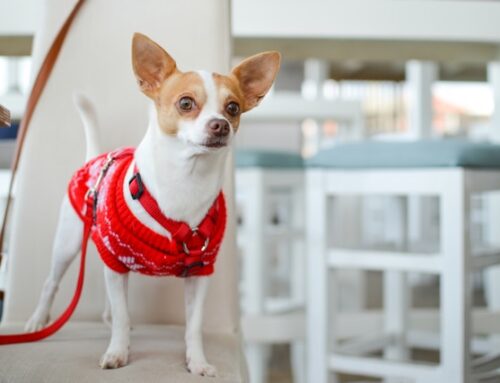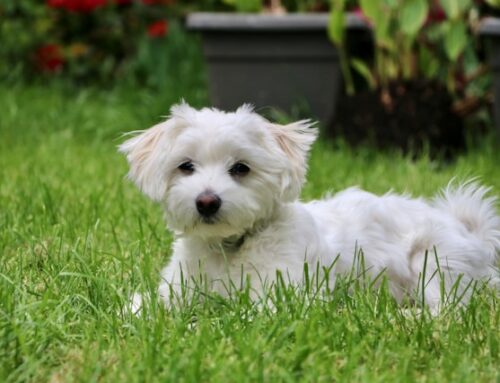Overview
Introduction: Mini Goldendoodle Full Grown

Mini Goldendoodles are beloved for their adorable appearance and friendly demeanor, but their full-grown size is often a topic of curiosity and fascination.
In this article, we delve into the world of Mini Goldendoodles at their adult size, exploring the characteristics, temperament, and care requirements of these charming dogs.
From their petite stature to their playful personalities, discover what makes Mini Goldendoodles so special as they reach their full-grown potential. Learn all about the Mini Goldendoodle full grown size and why they’re such a popular choice for families looking for a loving and loyal companion.
Brief Overview of Miniature Goldendoodles
Miniature Goldendoodles are a popular hybrid breed known for their friendly nature and intelligence. They are a cross between a Golden Retriever and a Miniature Poodle, resulting in a small to medium-sized dog with a hypoallergenic coat.
Full-grown Mini Goldendoodles typically weigh between 15 to 35 pounds and stand about 13 to 20 inches tall. They are highly adaptable and make great family pets due to their playful and affectionate temperament.
If you’re looking for a Goldendoodle puppy, consider the Mini Goldendoodle as they are a wonderful mix of the friendly Golden Retriever and the intelligent Poodle. Whether you prefer a Mini Golden full grown, a toy Goldendoodle, or a medium Goldendoodle, these dogs are sure to bring joy and companionship to your family.

Purpose of the Guide
The Mini Goldendoodle guide is designed to provide valuable information and insights into raising and caring for a Goldendoodle puppy. It covers various aspects of the breed, including their characteristics, temperament, and grooming needs.
Whether you’re a first-time owner or experienced with Golden Retrievers, this guide aims to help you understand the unique traits of the Mini Goldendoodle, from puppyhood to full-grown adulthood. Learn about the parent breeds, the Golden Retriever and the Mini Poodle, and how they contribute to the size and temperament of the Mini Goldendoodle.
Discover the differences between a Mini Goldendoodle full grown and other sizes, such as standard Goldendoodle and toy Goldendoodle. Gain insights into the grooming needs of a Mini Goldendoodle, including how to care for their coat and prevent matting.
Whether you’re considering a Mini Goldendoodle, a medium Goldendoodle, or any size in between, this guide is a comprehensive resource for understanding and caring for your new furry friend.
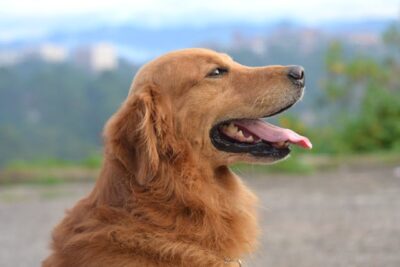
Understanding Miniature Goldendoodles
Definition and Origin
Miniature Goldendoodles, also known as Mini Goldendoodles, are a hybrid dog breed that originated in the United States in the early 1990s. They are a cross between a Golden Retriever and a Miniature Poodle, with the Poodle parent sometimes being a Toy Poodle.
This cross results in a dog that combines the intelligence and friendly nature of both parent breeds. Mini Goldendoodles are smaller than standard Goldendoodles but larger than Toy Goldendoodles, and they can also be referred to as Medium Goldendoodles.
They typically weigh between 15 to 35 pounds and stand about 13 to 20 inches tall at the shoulder when fully grown. They are known for their hypoallergenic coats, making them a popular choice for people with allergies. Mini Goldendoodles are highly adaptable and make excellent family pets due to their affectionate and playful demeanor.
Key Characteristics
Mini Goldendoodles tend to inherit the friendly and social nature of their Golden Retriever parent, making them great companions for families and individuals alike. They are known for their intelligence and trainability, which, combined with their playful demeanor, makes them a joy to have around.
In terms of size, Mini Goldendoodles fall between the larger Standard Goldendoodles and the smaller Toy Goldendoodles, typically ranging from 13 to 20 inches in height and weighing between 15 to 35 pounds.
They often have a hypoallergenic coat, which can vary in texture from curly to wavy, making them suitable for individuals with allergies. Medium sized Goldendoodles are also popular for those looking for a slightly larger but still manageable.

Unique Traits and Temperament
Mini Goldendoodles inherit a blend of traits from their parent breeds, the Golden Retriever and the Miniature Poodle. They are known for their friendly and sociable nature, making them excellent companions for families and individuals alike.
Mini Goldendoodles are also highly adaptable and can thrive in various living situations, from apartments to larger homes. Additionally, they are often praised for their intelligence and trainability, making them a joy to train and interact with.
Miniature Goldendoodle Size and Growth
Factors Influencing Mini Goldendoodle Size
The size of a Mini Goldendoodle full grown can vary depending on several factors, including genetics, specifically the size of the parent breeds (Golden Retriever and Poodle). Mini Goldendoodles are typically smaller than Standard Goldendoodles but larger than Toy Goldendoodles, with Toy Poodle genetics contributing to their smaller size.
A Mini Goldendoodle’s weight can range from 15 to 35 pounds, and their height can vary from 13 to 20 inches tall at the shoulder. While there is no specific growth chart for Mini Goldendoodles, monitoring their growth and consulting with a veterinarian can help ensure they are developing healthily.
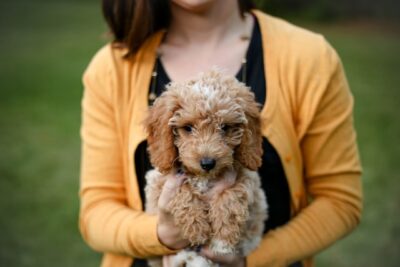
Average Mini Goldendoodle Size
Miniature Goldendoodles, a mix of Golden Retriever and Toy Poodle or Miniature Poodle, typically weigh between 15 to 35 pounds and stand about 13 to 20 inches tall at the shoulder when fully grown. They are smaller than Standard Goldendoodle but larger than Toy Goldendoodle, with their size influenced by the Poodle lineage.
While some breeders may advertise “Teacup Goldendoodle,” this extremely small version is not recognized as a separate breed standard and may be prone to health issues due to their size.
Growth Stages from Puppy to Adult
Mini Goldendoodles undergo rapid growth in their first few months, with their size influenced by their Golden Retriever lineage and the size of the purebred Poodle parent. As puppies, they can gain weight quickly, so it’s important to monitor their growth to ensure they develop at a healthy rate.
They typically reach their full size by around 12 to 18 months of age. While they are smaller than Standard Goldendoodles and larger than Toy Goldendoodles, Mini Goldendoodles are considered medium-sized doodles and may require less space and exercise compared to larger dogs.
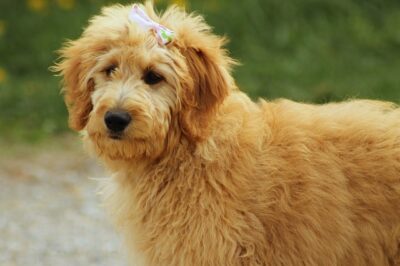
Appearance and Coat of Mini Goldendoodle Full Grown
Coat Types and Colors
The Miniature Goldendoodle is a charming breed known for its delightful appearance and a coat that’s both curly and healthy. Their compact size makes them suitable for various living environments, from apartments to larger homes.
One of the breed’s most desirable traits is its minimal shedding, which is ideal for individuals with allergies or those who prefer a cleaner home. Miniature Goldendoodles come in a variety of colors, adding to their appeal and making them a popular choice for families looking for a hypoallergenic pet.
Grooming Needs
The Miniature Goldendoodle’s grooming needs are influenced by its status as a designer dog breed and its smaller size. Their healthy coat, often curly, requires regular grooming to prevent matting and maintain its luster.
Despite being smaller in size, Miniature Goldendoodles still require regular brushing and grooming to keep their coat in top condition. Understanding the various Goldendoodle sizes can help owners manage their grooming needs effectively. Proper grooming ensures that their curly coat remains healthy and free of tangles.
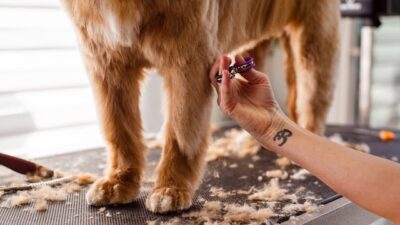
Shedding and Allergies
The Mini Goldendoodle is a popular choice for those with allergies due to its minimal shedding. Their smaller size makes them a suitable option for individuals living in apartments or smaller homes. However, it’s important to note that no dog breed is entirely hypoallergenic, and individual reactions can vary.
Regular grooming and cleaning can help reduce allergens in the home, making it more comfortable for allergy sufferers. Overall, the Mini Goldendoodle’s size and coat type make it a favorable choice for those looking for a dog with minimal shedding and potential allergens.
Personality and Temperament of Miniature Goldendoodle
Characteristics of Mini Goldendoodles
Mini Goldendoodles inherit their temperament from both their Golden Retriever and Poodle ancestors. They are known for being intelligent dogs, which makes them easy to train and eager to please. Their size, smaller than standard Goldendoodles, makes them great family pets suitable for various living situations.
As designer dogs, Mini Goldendoodles exhibit their own unique characteristics, blending the best traits of both parent breeds. Overall, their friendly nature and adaptability make them wonderful companions for individuals and families alike.
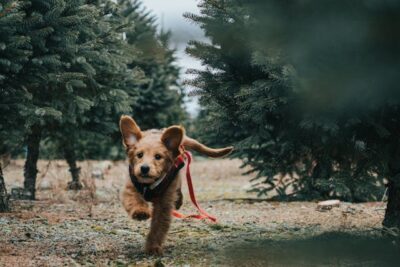
Behavior Traits
Miniature Goldendoodles are a versatile breed known for their affectionate nature, making them excellent therapy dogs and excellent dogs for kids. They are typically friendly and social, enjoying the company of both humans and other animals.
However, they may be prone to separation anxiety if left alone for long periods, so it’s important to acclimate them to being alone gradually. Proper training and socialization can help reduce this behavior.
Additionally, Miniature Goldendoodles are not known for excessive barking, making them suitable for apartment living or quieter environments. Creating a comfortable puppy home and providing early training and socialization are crucial for raising a well-adjusted Miniature Goldendoodle.
Training Tips for a Well-Behaved Dog
When bringing a Miniature Goldendoodle into smaller living spaces, it’s essential to start their training early. Set up a designated area in your home for your puppy, ensuring it’s comfortable and safe. Since Mini Goldendoodles may be prone to separation anxiety, gradually accustom them to being alone for short periods to prevent this behavior.
Consistent potty training and obedience training are key to raising a well-behaved Miniature Goldendoodle. With their intelligence and eagerness to please, Mini Goldendoodles are capable of learning commands and behaviors quickly, making training a rewarding experience for both you and your dog.

Health and Care For Mini Goldendoodle
Common Health Issues
Mini Goldendoodles are generally a healthy breed, thanks to their status as a hybrid breed. However, they may be prone to certain health issues, such as hip dysplasia and progressive retinal atrophy, a degenerative eye disease.
Another common concern is floppy ears, which can lead to ear infections if not kept clean and dry. Regular veterinary check-ups, proper grooming, and a healthy diet can help ensure the overall health and well-being of your Mini Goldendoodle.
Diet and Nutrition
It’s crucial to provide your Mini Goldendoodle with a well-balanced diet tailored to their size and activity level. Since Mini Goldendoodles weigh less than larger dog breeds, they require fewer calories to maintain a healthy weight.
Consider feeding them a high-quality dog food formulated for smaller dogs to ensure they receive the necessary nutrients. Regular monitoring of their weight and adjusting their diet as needed can help prevent obesity and other health issues.
Exercise Requirements
Mini Goldendoodles are energetic and require regular exercise to stay healthy and happy. Since Mini Goldendoodles weigh less than larger breeds, they typically need about 30 minutes to 1 hour of exercise per day.
Activities like brisk walks, playtime in a fenced yard, or interactive games can help meet their exercise needs. Regular exercise not only helps maintain their physical health but also stimulates their minds, preventing boredom and unwanted behaviors.
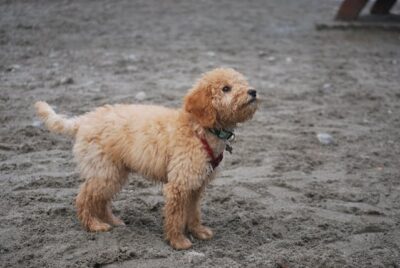
Mini Goldendoodle Full Grown: What to Expect
Changes in Behavior
As Mini Goldendoodles mature, their behavior may change slightly. They may become more independent but still remain affectionate and friendly. Some Mini Goldendoodles may become calmer with age, while others may retain their playful and energetic nature.
Proper training and socialization from a young age can help ensure that they develop into well-behaved adult dogs.
Adjustments in Care and Routine
As Mini Goldendoodles reach adulthood, adjustments in their care and routine may be necessary. Their exercise needs may change, requiring more or less activity depending on their energy levels and age.
Adjustments to their diet may also be needed to maintain a healthy weight and meet their nutritional needs. Regular veterinary check-ups are essential to monitor their health as they age and to address any age-related issues that may arise.
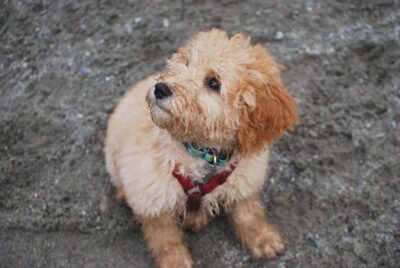
Mini Goldendoodle Full Grown vs. Standard Goldendoodle
Key Differences in Size and Temperament
When comparing Mini Goldendoodles to Standard Goldendoodles, the key differences lie in size and temperament. Standard Goldendoodles are larger, weighing between 50 to 90 pounds, while Mini Goldendoodles weigh between 15 to 35 pounds.
Temperament-wise, Standard Goldendoodles may have a more laid-back demeanor similar to Golden Retrievers, while Mini Goldendoodles, being smaller, may be more energetic and playful. It’s important to note that there is no official “teacup” Goldendoodle size, and breeders claiming to have teacup Goldendoodles may be breeding unhealthy dogs.
Considerations for Choosing Between the Two
When choosing between a Mini Goldendoodle and a Standard Goldendoodle, consider your living situation and lifestyle. Mini Goldendoodles are better suited for smaller living spaces and may require less exercise than Standard Goldendoodles.
Standard Goldendoodles, on the other hand, are more suitable for families with ample space and those looking for a larger, more laid-back dog. Additionally, consider the time and effort you can dedicate to grooming, as Standard Goldendoodles may require more maintenance due to their larger size and coat.
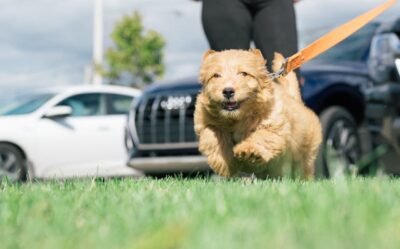
Longevity and Aging
Life Expectancy of Mini Goldendoodles
Mini Goldendoodles have a relatively long lifespan compared to some other dog breeds. On average, they can live between 10 to 15 years, depending on various factors such as genetics, diet, and overall health care. Providing your Mini Goldendoodle with regular veterinary check-ups, a balanced diet, and regular exercise can help ensure they live a long and healthy life.
Aging Gracefully: Caring for Senior Mini Goldendoodles
As Mini Goldendoodles age, their care needs may change. It’s important to provide them with a balanced diet suitable for senior dogs, as well as regular veterinary check-ups to monitor their health.
Senior Mini Goldendoodles may benefit from gentle exercise to keep them mobile and maintain muscle tone. Additionally, providing them with a comfortable and safe environment, along with plenty of love and attention, can help them age gracefully.
Health Challenges in Older Mini Goldendoodles
As Mini Goldendoodles reach full maturity and age, they may be prone to certain health challenges common in older dogs. These may include arthritis, dental issues, and cognitive decline. Regular veterinary check-ups and screenings can help detect and manage these issues early.
Providing a balanced diet, suitable for senior dogs, along with appropriate exercise, can help maintain their overall health and well-being. With proper care and attention, many Mini Goldendoodles can enjoy a good quality of life well into their senior years.
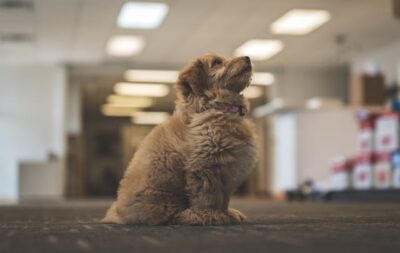
Mini Goldendoodles in Different Environments
Urban Living vs. Suburban or Rural Settings
Mini Goldendoodle full grown, can adapt well to various environments, including urban, suburban, or rural settings. In urban areas, they may thrive with regular walks and visits to dog parks, making them suitable companions for city living.
In suburban or rural settings, they can enjoy more open spaces for exercise and exploration. Regardless of the environment, it’s important to provide them with regular exercise, mental stimulation, and socialization to ensure their well-being and happiness.
Adaptability to Different Climates
Mini Goldendoodle full grown, are known for their adaptability to different climates. Their coat, which is often a mix of their Golden Retriever and Poodle heritage, provides insulation in both cold and warm weather.
In colder climates, they may benefit from a sweater or coat during walks, while in warmer climates, they may appreciate access to shade and plenty of water to stay cool. Regardless of the climate, it’s important to monitor them for signs of overheating or discomfort and adjust their environment accordingly.
Ideal Living Conditions for a Mini Goldendoodle
Mini Goldendoodle full grown, thrive in environments that provide plenty of love, attention, and exercise. They are adaptable to various living conditions but generally do well in homes with a fenced yard where they can play safely.
Regular walks and playtime are important to keep them physically and mentally stimulated. Additionally, providing them with a comfortable indoor space where they can rest and relax is essential. Overall, a loving home with a balance of exercise and relaxation is ideal for a Mini Goldendoodle full grown.
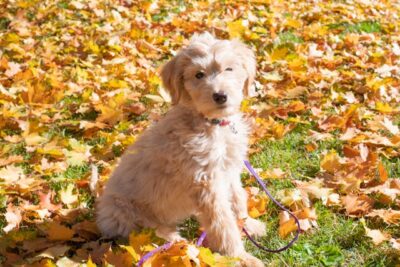
Conclusion: Mini Goldendoodle Full Grown
Recap of Mini Goldendoodle Full Grown
Mini Goldendoodles are a popular hybrid breed known for their friendly nature and intelligence. They are a cross between a Golden Retriever and a Miniature Poodle, resulting in a small to medium-sized dog with a hypoallergenic coat.
Full-grown Mini Goldendoodles typically weigh between 15 to 35 pounds and stand about 13 to 20 inches tall. They are highly adaptable and make great family pets due to their playful and affectionate temperament. Mini Goldendoodles are known for their minimal shedding, making them suitable for individuals with allergies or those who prefer a cleaner home.
Final Thoughts on Mini Goldendoodle Full Grown
Mini Goldendoodles are delightful companions that bring joy and companionship to families and individuals alike. Their friendly nature, intelligence, and adaptability make them excellent pets for various living environments. Whether you choose a Mini Goldendoodle full grown, a toy Goldendoodle, or a medium Goldendoodle, you’re sure to find a loving and loyal companion.
Understanding the unique traits and care needs of a Mini Goldendoodle, from puppyhood to full-grown adulthood, is key to providing them with a happy and healthy life. With proper training, grooming, and care, your Mini Goldendoodle can be a cherished member of your family for years to come.
If you’re interested in bringing a Mini Goldendoodle into your home, consider our Goldendoodle puppies for sale in Florida and surrounding areas. Our Goldendoodle puppies are thoughtfully bred from reputable breeders. They are healthy, friendly, and cared for as family.
Frequently Asked Questions (FAQs): Mini Goldendoodle Full Grown
- What is the size of a Mini Goldendoodle full grown?
- Full-grown Mini Goldendoodles typically weigh between 15 to 35 pounds and stand about 13 to 20 inches tall at the shoulder. They are smaller than standard Goldendoodles but larger than Toy Goldendoodles.
- Do Mini Goldendoodles shed?
- Mini Goldendoodles are known for their minimal shedding, making them suitable for individuals with allergies or those who prefer a cleaner home. However, no dog breed is entirely hypoallergenic, and individual reactions can vary.
- How much does a Mini Goldendoodle weighs?
- Mini Goldendoodles can weigh between 15 to 35 pounds when fully grown, depending on various factors such as genetics and diet.
- What kind of pet owners are Mini Goldendoodles suitable for?
- Mini Goldendoodles are suitable for a wide range of pet owners, including families, singles, and seniors. They are adaptable to various living situations, from apartments to larger homes.
- How do Mini Goldendoodles compare to larger dogs?
- Mini Goldendoodles are smaller than larger dog breeds, making them more manageable in terms of size and exercise needs. They are often a popular choice for pet owners looking for a smaller, more compact dog.
- Are Mini Goldendoodles slightly larger than Toy Goldendoodles?
- Yes, Mini Goldendoodles are slightly larger than Toy Goldendoodles, but smaller than Standard Goldendoodles. They fall in between these two sizes, making them a medium-sized breed.
- Where can I find reputable breeders for Mini Goldendoodles?
- It’s important to do thorough research and find reputable breeders who adhere to responsible breeding practices. Look for breeders who prioritize the health and well-being of their dogs and puppies.
- What should I look for in Mini Goldendoodle breeding practices?
- Look for breeders who health test their breeding dogs, provide proper socialization for their puppies, and follow ethical breeding practices. Avoid breeders who prioritize profit over the welfare of their dogs.
- Are there different sizes of Goldendoodles?
- Yes, there are different sizes of Goldendoodles, including Standard, Miniature, and Toy sizes. The size of a Goldendoodle can vary depending on the size of the Poodle parent used in the breeding.
- How can I ensure I’m getting a healthy Mini Goldendoodle?
- To ensure you’re getting a healthy Mini Goldendoodle, choose a reputable breeder who health tests their breeding dogs and provides proper care for their puppies. Regular veterinary check-ups and a balanced diet are also important for maintaining your dog’s health.


